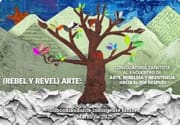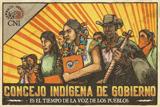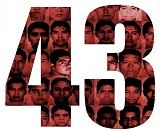Reflections Toward a Depatriarchal and Non-hierarchical Academia
Statement for depatriarchal and non-hierarchical worlds
After the publication of the interview with the Weychafe, compañera and intellectual, Moira Millán, in the newspaper El Salto, as well as the chapter entitled “The walls spoke when no one else would: Autoethnographic notes on sexual-power gatekeeping within avant-garde academia” (Viaene, Laranjeiro y Tom), we cannot remain silent. We also have to point out that we have been raising our voices for many years through concrete personal and collective actions within our academic, university, activist and organizational spaces, as well as in our collectives, networks and movements. We denounce and challenge the hierarchies of knowledge/power intrinsic to the academy, and the gender violence, harassment and sexual abuse in those institutions. At the same time, we recognize that all we have done is insufficient and requires us to continue, redoubling our efforts, weaving together more and more struggles, and to root out the violence that underlines ongoing wars and the violations of women, children, Mother Earth, all those who are othered.
We should not forget that patriarchy is the oldest form of domination. Humanity learned to dominate the female body in all cultures, as the diverse feminisms of Afro/Abya-Yala/Latin America affirm. Patriarchy is an onto-epistemic configuration that privileges hierarchy, appropriation, denial of others, control, the fetishism of things, reproduction, violence and wars. It deeply shapes subjectivities and affects the lives of everyone. Academia has been one of its most effective pillars through its creation of an instrumental, objectifying, competitive and hierarchical worldview which naturalizes and invisibilizes practices of knowledge/power.
The civilizational crisis that the planet Earth is experiencing is the result of cis-heteropatriarchy in its historical entanglement with capitalism, colonialism, anthropocentrism, and racial, sexual and ableist hierarchies. This is the complex background that we invoke when denouncing the multiple forms of violence exercised against women, which have been constant throughout history. This background unleashed the Terricide (Moira Millán), a powerful cosmopolitical concept coined by the Movement of Indigenous Women and Diversities for Good Living [Movimiento de Mujeres y Diversidades Indígenas por el Buen Vivir], which has its origin in Puelmapu a decade ago.
In the face of this polycrisis underpinned by the intensification of cis-heteropatriarchal barbarity, we reaffirm our determination to what we are already doing and not only saying or subscribing to: to continue our on-going struggle through embodied and situated ways in order to move towards the creation of truly post-patriarchal, pluriversal societies centered on care, cooperation, freedom and the eradication of all forms of subordinating hierarchies –societies where everyone, together with other living beings, can co-exist nosótricamente (in togetherness), in mutual nurturing and, as the Venezuelan ecofeminist Liliana Buitrago tells us, in the loving exercise of interdependence (chat, Pacto Ecosocial del Sur). Our commitment to this collective project under construction has been –and is–, from our everyday work. We know this requires the sustained creation of societies and academias (with a lowercase “a” and in plural) very different from the current ones.
The Academy: a contested field
The Academy (with a capital A and in singular) is for us a field of contestation. And, without a doubt, we are all positioned in it once we dare to enter it, dialogue with it, challenge it, inhabit it and/or co-construct it. Many of us have occupied this space by choice and with conviction. We face this reality every minute of our lives. That is why the manifesto “We all know” resonates and challenges us when it states that epistemic extractivism is structural and not just an isolated event in the Academy. When it affirms that the Academy is hierarchical and hierarchizing and that it promotes the accumulation of power of those at the top. Many of whom, in recent times, have been accused of moral or sexual abuse and harassment. In this context, it is the women who denounce who are questioned, while the accused is made to appear as a “victim”.
It is crucial to note that too often the systems for reporting sexual and moral harassment, as well as epistemic extractivism, far from addressing and repairing the damage, result in mere declarations that give the impression that something will be done, but in the end “serve as performative movements that validate not really doing anything” (e.g., Sara Ahmed). We need to be mindful of the fact that the forms that harassment and the institutional responses take are often differentiated when it comes to academics, activists and intellectuals from subalternized and racialized groups. Who cares about them? (Yu Derkys) Who is willing to listen to these complaints? How many racialized and subalternized women are tired of talking and talking and no one listening? Who is willing to make time to listen and act as an interlocutor in the midst of the violent-and-systemic no-time in which we live?
The Academy is thus a reflection of a society traversed by oppressions and rebellions, with the difference of having a recognized autonomy and authority to protect critical thinking. This difference can be instrumentalized to protect those who occupy places of power. Sexual abuse, as in the rest of society, is the visible aspect of a myriad of cis-heteropatriarchal and sexist practices ranging from complicity among academics —when publishing and recirculating citations—, to sexual abuse and harassment that have been and are constantly denounced.
Indigenous Women and Academia
In November 2018 in Buenos Aires, at an informal dinner where we were sharing our lives and struggles, compañera Moira Millán told us what is now published in the newspaper El Salto. With hindsight, one might ask: why did Moira share it only in a private space? Why did she not file a legal complaint? In her interview, Moira mentions her reasons. Exercising critical self-reflection, we could also ask: why didn’t we –her listeners– act forcefully and, at that very moment, urge her to file a complaint and accompany her before the academic institutions to which the accused belonged to or with which he collaborated in a clear role of transnational intellectual leadership? So, what did we do then? 1) Support Moira and the movement she belongs to in the academic spaces to which we had invited her. 2) Several of us have been articulating untiringly with Moira and the movement, as well as with other compañeras and movements, to look for better ways to confront violence and dispossession. 3) Strengthen the transnational networks of alternatives that exercise autonomy de facto and without asking for permission.
The day after the dinner, we, Moira Millán and the compañeras of the Movement of Indigenous Women and Diversities for Good Living, spoke at a panel to which we had invited her. Our panel was part of the “First World Forum of Critical Thinking” [Primer Foro Mundial del Pensamiento Crítico] and the 8th Latin American and Caribbean Conference of Social Sciences of CLACSO [8va Conferencia Latinoamericana y Caribeña de Ciencias Sociales de CLACSO]. There we had the opportunity to launch a first political-academic act with Moira, our other guests and the audience, when we demanded a more suitable and worthy place to hold our panel. The last straw and ultimate deciding factor was the impossibility of accommodating the wheelchair of our feminist colleague and commentator, Mercedes Olivera (may she rest in peace). Mercedes’ chair could not fit in the tiny space allotted to our panel. We collectively took over the space in front of one of the large conference halls. Once we had moved to the large auditorium, Moira and all the indigenous women invited by our Working Group “Bodies, Territories, Resistances” [Cuerpos, Territorios, Resistencias-GT CUTER] continued the session.
A packed auditorium strongly supported the panel and the words of the invited speakers. This act of rebellion of which we –speakers, hosts and audience– were all the protagonists, translated into something like this: Not one single undignified treatment for racialized, subalternized women will be allowed! After that moment, CLACSO approved the entry of more and more working groups with the participation of social leaders, intellectuals and wise women elders from communal territories. We believe that our “collective revolt” set an important precedent.
Moira’s words and actions were in tune with ours and helped us to ratify the personal and collective path that we have pursued for decades already before 2016, when we started the CUTER Working Group: to inhabit our academic and university institutions, the alternative institutions that we are building with women and diverse others, as well as peoples in resistance, seeking to do it in a dignified and respectful manner without getting trapped by ventriloquism or extractivism. We also open spaces inside and outside Academia in order to position the kind of work/life/struggle that we practice.
Every day, in the different territories we inhabit (including Academia), minute by minute, we feel, think, and embody concrete actions to confront violence, oppression and wars. This is how different members of the CUTER Working Group embrace, embody and “reweave the web of life” (Lorena Cabnal and the Network of Ancestral Healers of Territorial Community Feminism), hand in hand with indigenous, Afro-descendant, Afro-diasporic, peasant, popular, alter-urban women, as well as sexual diversities in different times and geographies.
Exits from the labyrinth are insufficient and dangerous
We respect and understand the diverse paths that complainants of sexual abuse and harassment take in their search for justice, redress of grievances and the healing of society as a whole. We believe that at the heart of our reflections and denunciations of sexual harassment and epistemic extractivism there has to be the principle of care. It is important to recognize the time taken by those who were abused, and who later share their experiences in confidentiality. Respecting the time to heal is a form of care. This means not taking the right to publicly expose an experience of sexual harassment and epistemic extractivism without the explicit consent and accompaniment of the abused person. Because it re-victimizes and promotes punitive measures instead of reparation. In short, what must be at the center of our response are the victims and their temporal dynamics and needs.
In many cases, the plaintiffs take the legal route. In fact, today the movements of women and peoples in resistance are simultaneously in the courts and on the streets mobilizing. The question then arises: what kind of justice are we talking about? How to achieve it? Which of the many possible avenues to take? Who feels called upon to accompany them? And all this knowing that even in so-called “democratic” countries the justice dispensed by the State is easily bought, while in non-democratic countries, more than 95% of gender violence goes unpunished. Therefore, we cannot expect much from the cis-heteropatriarchal justice offered by academic institutions or the State.
We know that the punitive apparatus and the culture of punishment are an essential part of the scaffolding of the State and modern societies. It is through them that carceral societies premised on extraction and accumulation are perpetuated, with justice systems that pretend to maintain “security and order” while showing no mercy against impoverished, marginalized and racialized populations.
As a recent feminist anti-punitivism text points out, there is no easy way out, nor one that is free of contradictions and complexities. Moreover, we are aware of the importance of recognizing that “the debate on anti-punitivism cannot fall into the easy temptation of settling within the theoretical realm” (Laia Serra). This is the institutional and academicist temptation. For feminist anti-punitivism it is necessary to enter the “political storm of the implementation” of justice. And yet the theoretical-political horizon can/should be the feminist self-management of violence and the abolitionist vision of society and justice. As Serra rightly says: “the collective self-management of violence outside the State [the apparatus of the law and the punitive apparatus that underlies it] is an alternative that is still under construction” and, we should add, presents other risks and challenges.
We are witness to the dignified rage that Moira expresses in her denunciation. Her rage reflects the feelings of many women who have not received the necessary attention and who continue to suffer the violence of the cis-heteropatriarchal, academic and dispossession systems in many territories. As social science workers, members of the CUTER WG, we resist with and among peoples –women, men, children, youth and communities rooted in the earth. The denunciations that we are accompanying or embodying through collaborative research trajectories and collective actions allow us to affirm that the cis-heteropatriarchal subconscious is also reproduced in many collectives, organizations and alternative movements. Breaking women, by sexual means, is part of the dispossession and imperialist-capitalist-homocentric domination that seeks to annihilate personal dignity and collective and communal subjectivities.
We call upon ourselves and others to continue creating concrete places of de-hierarchization of power and spaces of healing in the face of institutionalized and state-led impunity. As social science workers together with artists, activists and territorial and communitarian feminists, we will continue to unmask and fight, personally and collectively, all forms of humiliation, extermination and co-optation of women in the territories. In this way we will continue to find ways to heal from the cis-heteropatriarchal system in the different places where we find ourselves, of whatever gender we identify with, of the territories we inhabit and the stories we write and share.
The movements of victims of human rights violations emphasize four criteria that seem to us eminently applicable to cases of sexual abuse and harassment: the right to truth, reparation, non-repetition, and justice. In this sense, we urge the various academic institutions (national, Latin American, Caribbean and transnational) that are involved in one way or another in cases of sexual abuse, harassment or epistemic extractivism, to review their protocols and committees on ethics and epistemic and gender violence. It is undoubtedly important to uphold the principle of “zero tolerance and rejection of sexual harassment” (CLACSO), although we believe that it is insufficient.
We believe that in all the spaces where we move and work as social science workers, activists and feminists, we must continue to work collectively and hand in hand with institutional authorities in the implementation of protocols, committees and internal policies (which should be explicitly accessible), to promote appropriate and expeditious mechanisms to prevent, denounce, discuss and act against sexual abuse and harassment, as well as gender and epistemic violence. Each national academic institution usually has ad-hoc commissions and codes. Any supranational academic coordination should have them, and review and update them permanently. If they do not have them, they should create them. It is not enough –for the reasons mentioned above– to let “independent commissions” do the necessary work. We repeat, this is insufficient, and even dangerous.
We were taken aback and outraged by the response of Boaventura de Sousa Santos, who reduced the accusations of former students in their auto-ethnography to being just an act of “revenge”. “Feminist social theory itself points out that there is no place, there is no subject untouched by the relations of domination and their intersections. To emancipate ourselves from them, to make them recede, we have to look them in the face, recognize them in ourselves, and not try to hide in which parts of us they inhabit… It is by bringing them to light, by debating them, that the possibility of change is born” (Lang and Segato).
We require academic and societal communities to debate in depth, to learn permanently, to expand our imagination and to (re)create collectively on-going emancipatory processes –liberating praxes– in the face of omissions, indifference and expressions of re-victimization of the aggrieved women and the affected communities. We believe that what is at stake is the collective construction of just, relational and healing societies; other worlds possible here and now, as the Zapatistas say and do practice.
Signataries:
Xochitl Leyva Solano (Chiapas, México)
Arturo Escobar (Colombia/EE.UU.)
Rosalba Icaza (Países Bajos/México)
Patricia Botero (Colombia)
Valentín Val (Chiapas, México/Argentina)
Jorge Alonso (Guadalajara, México)
Fermín Ledesma (Chiapas, México)
Maydi Estrada Bayona (GT CUTER)
Aline De Moura (Brasil)
Lola Cubells Aguilar (País Valenciano, España)
Alain Basail Rodríguez (Chiapas, México/Cuba)
Axel Köhler (Chiapas, México/Alemania)
Alberto C. Velázquez Solís (Yucatán, México)
Leandro Bonecini de Almeida (Brasil)
Carmen Ventura (México)
Jesús González Pazos (Euskal Herria-País Vasco)
Luiza Dias Flores (Amazonas, Brasil)
Huáscar Salazar Lohaman (Cochabamba, Bolivia)
Rosa Claudia Lora Krstulovic (Ciudad de México, México)
Wendy Harcourt (Países Bajos)












